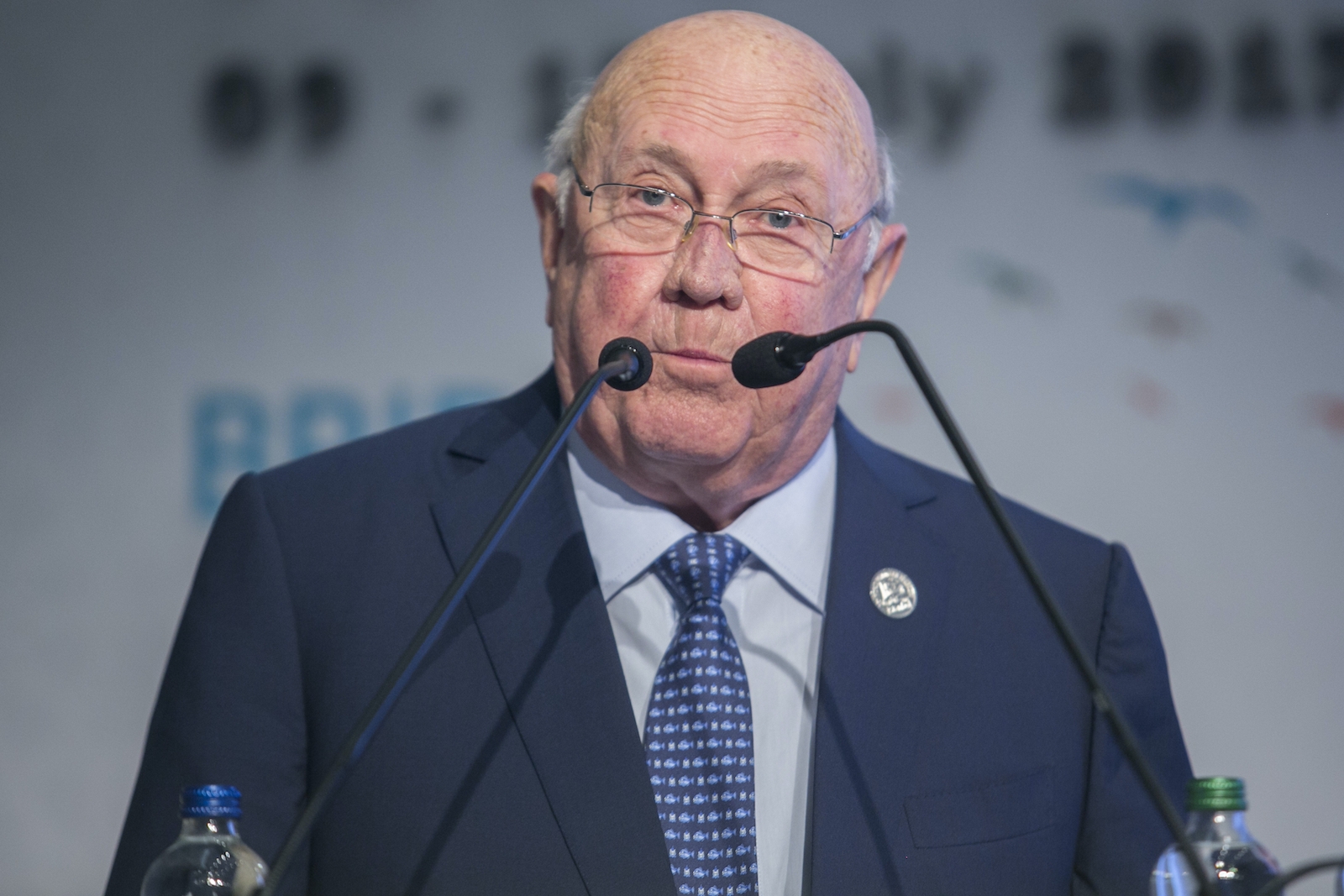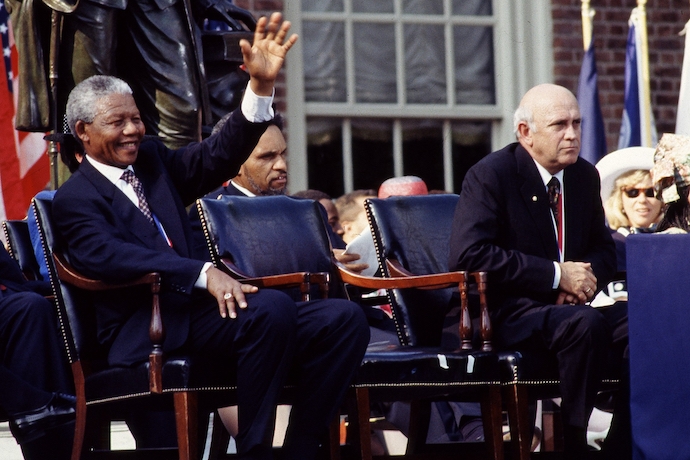
FW de Klerk: A Negotiator Before Defeat
Rarely is the pragmatist admired. Be it in policy or politics, such a figure induces suspicion, a concern that principles will have to be subordinated to broader goals. True dreamers and visionaries, for all their glaring faults, can take the accolades; the pragmatists can be given lower pegging.
These differences have proven stark with the late FW de Klerk, South Africa’s last apartheid president. “De Klerk,” suggested Mac Maharaj, formerly official spokesperson for former President Jacob Zuma, “was a man of the moment, and [Nelson] Mandela was a man of history.” The late Colin Eglin went one better in his observation of the two men. “A relatively conservative Afrikaner leader decided to negotiate before he had lost, and an imprisoned leader of a liberation movement decided to negotiate before he had won.”
It was de Klerk who began to take the screws out of the edifice of apartheid and open the pathway to negotiations with other parties. Serving in the governing white National Party, which had introduced apartheid in 1948, de Klerk held ministerial positions till becoming party head in February 1989. Between 1984 and 1989, he served as education minister, overseeing the notorious Bantu education program. On replacing PW Botha, de Klerk downgraded the State Security Council, primarily staffed by military and police, and restored civilian rule by cabinet.
De Klerk’s famous announcement to parliament on February 2, 1990 was critical in setting things in train. But he had little by way of choice. By the late 1980s, Apartheid South Africa was already unraveling, its furious racial disturbances tearing away at a white supremacist structure increasingly teetering on the edge of oblivion.
He also had encouragement from various sources. Externally, the Cold War was coming to a close, with Western backers seeing less need to keep an anti-communist proxy in Africa. The loss of Soviet influence, marked by the fall of the Berlin Wall in November 1989, also meant a diminishing of support for such communist organisations as the African National Congress.

Then came three sets of talks and discussions between Mandela and Justice Minister Kobie Coetsee, between ANC figures and South Africa’s National Intelligence Service, and discussions between Afrikaner intellectuals and the ANC conducted in the UK. South Africa’s last apartheid leader had been inspired, in no small part, by the propitiatory Harare Declaration, adopted by the ANC as a promise to pursue a democratic transition to transform South Africa “into a non-racial democracy.” Such organisations as the ANC, Pan-Africanist Congress (PAC), and the South African Communist Party were unbanned. A moratorium on the death penalty was implemented. Within nine days, Mandela walked free.
Difficulties quickly manifested. The Convention for a Democratic South Africa, presided over by both de Klerk and Mandela, imploded before a background of police, militia, and factional violence. There was mistrust between racial groups and within them. The Inkatha Freedom Party left early, claiming that Mangosuthu Buthelezi was not granted full scope to negotiate. ANC revolutionaries still giddy with insurrectionary fervour were not entirely content with the moderating calls of Nelson Mandela, Oliver Tambo, and Thabo Mbeki. Mandela, for his part, had called de Klerk the “head of an illegitimate, discredited minority regime…incapable of upholding moral standards.”
The political visions were divergent in vastness. The ANC wished to pursue a single, centralised state based on one person, one vote; the National Party preferred a looser federal structure with devolved powers that would still preserve a measure of control over the potential excesses of black majoritarianism. Certain Afrikaners demanded a separate volkstaat. There was no agreement on what any interim government would comprise, nor what form the new constitution would take.
In April 1993 at Kempton Park, Mandela’s ANC and de Klerk’s ruling white National Party commenced what was called the Multi-Party Negotiation Process (MPNP). There were representatives from 24 other parties, all steaming with different agendas and suspicions. The 1994 electoral victory for the ANC did much to affirm their standing, leading to the eventual December 1996 constitution.
De Klerk was left to wrestle with his role, and that of apartheid, which he preferred to call “separate development.” He remained a creature of his racial and political background, an ideologue of apartheid who found it impossible to intellectually abandon with any degree of confidence. To have done so would have been to negate genealogy and a social experiment he had not regarded as a total failure. His uncle, JG Strijdom, was the country’s second apartheid prime minister; his father, Jan de Klerk, was in the cabinet of three apartheid prime ministers.
His memoirs were filled with exculpatory efforts pointing to himself and his fellow NP politicians as “products of our time and circumstances.” In administering the race classification rules, de Klerk claimed to have done so “in the most humane manner possible.”
De Klerk’s statement to the Truth and Reconciliation Committee was testy, taking issue with the commission’s alleged bias while deeming efforts to brand apartheid a crime against humanity as “little more than a mobilisation exercise by the ANC and its totalitarian and Third World supporters in the UN General Assembly.” Victims of “crimes against humanity,” he dismissively asserted “do not generally achieve sustained population growth rates of more than 3% and their social and socio-economic statistics do not improve across the board.”
In 2020, it took irate remarks from the Desmond and Leah Tutu Foundation to remind de Klerk that the law had caught up, with the Rome Statute of the International Criminal Court declaring the racial policy to be such a crime. It had been, he stated, “unacceptable” to “quibble about the degrees of unacceptability of apartheid.” With such attitudes, it is unsurprising that figures such as the human rights lawyer Howard Varney had little time for this “apologist for apartheid.”
A posthumous video from de Klerk did little to elevate him. It is contrition in search of purpose and acceptance. “I, without qualification, apologise for the pain and the hurt and the indignity and the damage that apartheid has done to black, brown, and Indians in South Africa,” he is found stating. As he exited the world of the living, he was worried about what was happening to his country. “I’m deeply concerned about the undermining of many aspects of the constitution, which we perceive almost day to day.”
In one fundamental way, his own navigation of apartheid’s train into oblivion was a regretful concession to defeat – that a racial minority could no longer hold on, however vicious, however determined it might be. By 1996, de Klerk was forced off the train, acknowledging, in part, that he was part of the very legacy he was trying to exorcise. On receiving the Nobel Peace Prize with Mandela, it was clear where he stood. He had aided in creating the conditions; it was Mandela who would have to make the world anew.

